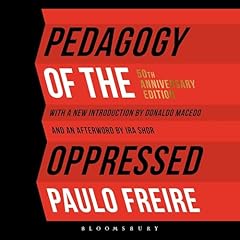
Experience and Education
No se pudo agregar al carrito
Add to Cart failed.
Error al Agregar a Lista de Deseos.
Error al eliminar de la lista de deseos.
Error al añadir a tu biblioteca
Error al seguir el podcast
Error al dejar de seguir el podcast
 Exclusivo para miembros Prime: ¿Nuevo en Audible? Obtén 2 audiolibros gratis con tu prueba.
Exclusivo para miembros Prime: ¿Nuevo en Audible? Obtén 2 audiolibros gratis con tu prueba.Compra ahora por $12.59
-
Narrado por:
-
Gary L Willprecht
-
De:
-
John Dewey
Experience and Education is the best concise statement on education ever published by John Dewey, the man acknowledged to be the pre-eminent educational theorist of the twentieth century. Written more than two decades after Democracy and Education (Dewey's most comprehensive statement of his position in educational philosophy), this book demonstrates how Dewey reformulated his ideas as a result of his intervening experience with the progressive schools and in the light of the criticisms his theories had received.
Analyzing both "traditional" and "progressive" education, Dr. Dewey here insists that neither the old nor the new education is adequate and that each is miseducative because neither of them applies the principles of a carefully developed philosophy of experience. Many pages of this volume illustrate Dr. Dewey's ideas for a philosophy of experience and its relation to education. He particularly urges that all teachers and educators looking for a new movement in education should think in terms of the deeped and larger issues of education rather than in terms of some divisive "ism" about education, even such an "ism" as "progressivism." His philosophy, here expressed in its most essential, most readable form, predicates an American educational system that respects all sources of experience, on that offers a true learning situation that is both historical and social, both orderly and dynamic.
©1938 Kappa Delta Pi (P)2013 Redwood AudiobooksLos oyentes también disfrutaron:




















Reseñas de la Crítica
Las personas que vieron esto también vieron:








but extremely more important how he thinks.It is the process,what is very important,not so concrete conclusions of his thinking about education.I do not
like to use a term “philosophy”.Now among philosophers are many,who are making philosophy to earn a living and themselves are not able to think clearly.
John Dewey can us teach how to think
Se ha producido un error. Vuelve a intentarlo dentro de unos minutos.
Great Philosophy Hard Listen
Se ha producido un error. Vuelve a intentarlo dentro de unos minutos.
Strange scratches in the audio
Se ha producido un error. Vuelve a intentarlo dentro de unos minutos.
Deweys classic book is more relevant to today's education professionals than ever.
Se ha producido un error. Vuelve a intentarlo dentro de unos minutos.
interesting
Se ha producido un error. Vuelve a intentarlo dentro de unos minutos.


